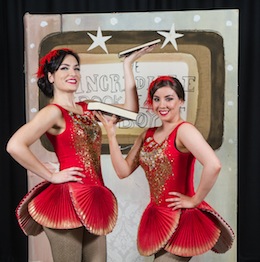The cover illustration of Oliver Jeffers’ best-selling storybook shows a stick-like child with an anxious face and a huge gaping mouth into which he is tossing a hefty hard-back book. He is Henry, a troubled boy with low self-esteem and an apparently low intellect. He is bullied to distraction by his sneering, smart-assed classmates, who take gleeful delight at his pathetic attempts at arithmetic and spelling. At home, he is dominated by his kindly but overbearing father (Alan Mehdizadeh), while at school his only supporter is Yvonne (Mary Frances Loughran), a timid, sweet-natured teacher, constantly out-manoeuvred and shouted down by her appalling pupils.
In Jeffers’ gently subversive but slight tale, Henry’s burgeoning consumption of the written word occurs “quite by mistake one afternoon when he wasn’t paying attention.” He starts nibbling at the corner of a page and before he knows it, he is wolfing down entire novels, textbooks, dictionaries. What’s more, to his utter amazement and delight, he finds himself becoming an infallible expert in just about every subject known to man.
But there is precious little theatricality in an accidental occurrence, hence the creation of the bullying issue as the context for Conor Mitchell’s new multi-layered adaptation, co-produced by Cahoots NI and The MAC. The scenario has been grafted on seamlessly and organically and gives no hint of tokenism or brow-beating moralising.
Three remarkable Northern Ireland talents have come together in this potentially thrilling collaboration: artist, illustrator and internationally successful children’s author Jeffers with music-theatre composer, dramatist and performer Mitchell and illusionist, magician, writer and director Paul Bosco McEneaney. When such an abundance of outstanding creative gifts combine, the result is guaranteed to be shot with ideas and visions that have the capacity to collide, spark, activate and react. In other words, a veritable feast of theatrical fireworks.
And so it is with this sophisticated, challenging show, presented in the towering space of The MAC’s main performance space, into which Sabine Dargent has slotted a spectacular set of lofty ladders, subtly painted bookshelves and an outsized banner, advertising the astonishing human freak show which the unfortunate Henry has become.
In the central role, McEneaney has cast Stuart Matthews, who, in 2008 and 2009, memorably played the lead role in Cahoots NI’s premiere of The Musician, Mitchell’s horror opera for children. Matthews is a bewitching performer, who combines a slightly wizened, world-weary face with a slender boyish frame. Veering away from the easy option of youthful charm and instant empathy, he does not shirk from exposing the dark vein that beats at the heart of Henry’s being. From his first sighting, cooped up in a shabby wooden crate and carted around by a third-rate travelling show, it is clear that this is a boy with severe and complex problems.
 Our guide along the reverse pathway of Henry’s fraught psychological, educational and gastronomical journey is Richard Mark’s suave, saturnine Maestro, whose musical counterpart is Mitchell himself, a manic, tail-coated presence behind the piano keyboard, marshalling the excellent six-strong orchestra then stepping out on stage in the guise of a mad Teutonic medic. The turn of the evening comes from Colette Lennon’s slinky, Latino-accented Librarian, whose powerful singing and ample, bouffant-haired figure sends out Trunchbull-like shock waves every time she shimmies down those never-ending ladders.
Our guide along the reverse pathway of Henry’s fraught psychological, educational and gastronomical journey is Richard Mark’s suave, saturnine Maestro, whose musical counterpart is Mitchell himself, a manic, tail-coated presence behind the piano keyboard, marshalling the excellent six-strong orchestra then stepping out on stage in the guise of a mad Teutonic medic. The turn of the evening comes from Colette Lennon’s slinky, Latino-accented Librarian, whose powerful singing and ample, bouffant-haired figure sends out Trunchbull-like shock waves every time she shimmies down those never-ending ladders.
But, unsurprisingly, the early stages of this complex new work are not entirely free of teething troubles. Confronted by the combination of Mitchell’s wonderfully risky ‘new’ music score – marred only by a tokenistic singalong number in a slightly mismatched second act – Jeffers’ off-the-wall storyline and McEneaney’s eye-watering illusions, the overall effect currently feels a little overcrowded and in need of sharper joined-up thinking. The busy staging, with shadowy lighting by Malcolm Smith, ranges the orchestra on one side and the comings and goings of the scene changes on the other. Together, they tend to distract the concentration from some of the crucial moments in the mounting hysteria surrounding Henry’s obsession. In a production overflowing with so much creativity and imagination, the less is more philosophy definitely holds good.
The moral of the tale carries real impact for thoughtful young sensibilities – that while books will undoubtedly open the door into worlds of wonder, their long-term benefits derive not through gluttonous immersion but at leisure and for pleasure. It’s a philosophy that can equally be applied to the delivery of this intelligent, spirited seasonal offering, which has the potential to spread its pleasures far and wide.
Jane Coyle is a Belfast-based freelance arts journalist and critic, who also contributes to The Irish Times, The Stage, Culture Northern Ireland and BBC Radio Ulster.